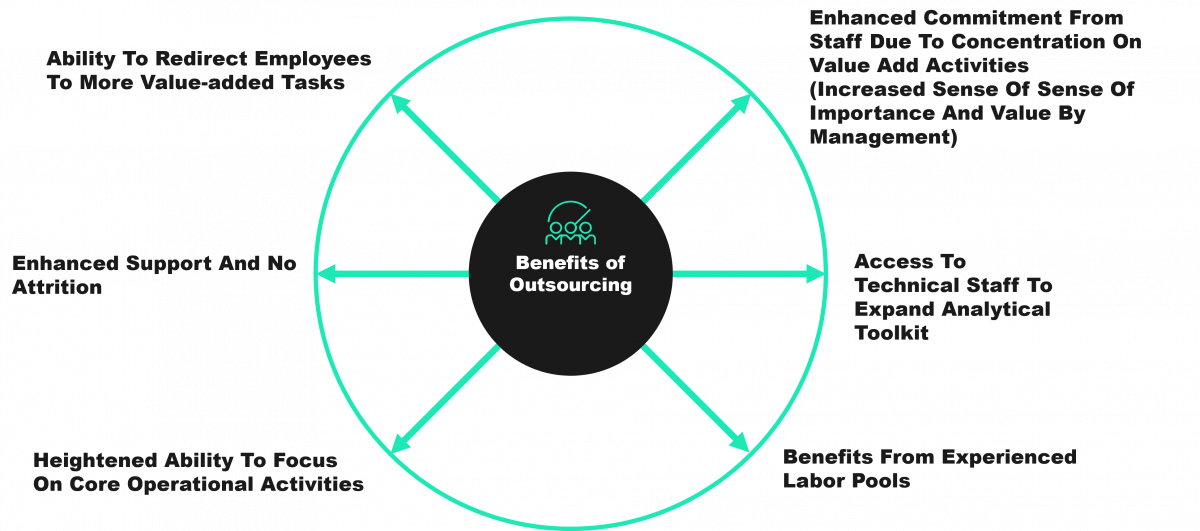Fortune 100 response to DE&I pressures

How organizations are outsourcing to service providers & the impacts of outsourced labor.

This article outlines the value creation and cost savings potential of outsourcing in a corporate environment. Outsourcing is a practical approach to cost reduction, risk mitigation and operational optimization. This paper discusses the use cases of outsourcing and its benefits, including lower operating costs, introducing greater flexibility, and reduced risk of human error. Although outsourcing management or portfolio company operations may loosen control over internal procedures, this piece aims to alleviate those concerns by detailing the operational synergy and efficiency impacts of outsourcing.

Benefits of Outsourcing
Outsourcing can enable organizations to accomplish work at a very low cost, and with greater efficiency. Wages in developed western countries differ significantly from developing countries. Work performed overseas in developing countries such as India can be performed at a lower cost basis than, say the United States, with the difference varying nearly 60%.
Developing countries are commonly where outsourcing vendors concentrate their operations. The Philippines, for instance, has a substantially lower cost of living and therefore lower wages. Industry statistics show that outsourcing to the Philippines can reduce labor costs by roughly 70% and even closer to 90%, while at the same time providing liveable wages to the local workforce.
Outsourcing helps companies experience significant savings in cost reduction in the rates vendors offer outsourced employees compared to in-house employees. In 2018, 62% of companies reported 10% to 25% savings when they outsourced and the remaining 38% of companies reported savings as high as 40%. Your organization can get a better perspective on cost savings by examining how outsourcing wages compare to in-house wages in some important areas.
In the call center space, the discrepancy in wages sticks out quite dramatically. A general rule of thumb is that in-house wages sit at roughly 2-2.5x the rate that outsourcing vendors charge. Therefore, if your organization pays in-house workers $30-$35 per hour, it is likely that an outsourcing vendor could provide resources to do the same work at $15 per hour.
These cost savings can also be realized when looking at bookkeeping and accounting services, another very commonly outsourced function. In-house bookkeepers average out to $74K per year, while an outsourced 3-person accounting team charges $48K per year. These cost savings can also be seen when your organization utilizes outsourced accountants on a monthly rate. This offers the added benefit of having the flexibility and control of short-term contracts, something that can further bolster the cost savings.
Software development is another example of a function with great opportunity in generating cost savings. The Philippines is a case in point; the average yearly wage for this type of work is $7,174 US dollars. Their American equivalents, on the other hand, earn on average $69,589 per year; in the UK, an equivalent of $41,551 USD; and in Australia, roughly $50,272 USD. A software engineer in the Philippines could be paid 80% less for doing the same job in the United States.
Although outsourcing solves many internal problems, there are still risks in humans performing accounting and bookkeeping. Whether the work is completed in-house or by contractors, there is always a possibility of minutely incorrect figures leading to significant implications. Incorrect figures and calculations can lead to late or missed payments, duplicated expenses, late fees, and penalties. However, this risk can be remediated through an outsourcing company. These outsourcing services require very minimal input from humans and close to no manual data entry. Not only can these services reduce the risk and costs inherent to the business, but they can also cut down on the size of the in-house various internal operations teams.
When considering opportunities to enhance value through outsourcing, there isn’t a one-size-fits-all solution. Cost reduction shouldn’t be the only factor when deciding on an outsourcing vendor. One of the key benefits of outsourcing is the flexibility to adapt to new organizational structures, technologies, or business focuses, something that is invaluable to a company looking to gain market share.
Sia Partners can help you assess the outsourcing potential of your processes through ideation workshops and business case analysis. Leveraging our experience in outsourcing and our deep experience across finance organizations, Sia Partners can provide solutions that optimize costs through outsourcing. On top of that, we can provide you access to global labor pools, both nearshore and offshore, which can be scaled rapidly and efficiently to meet your organization’s needs. We offer flexible pricing packages to meet your resourcing needs no matter the scale and complexity of the outsourcing challenge. Finally, our ability to offer longer-term and ongoing services to your organization allow us to utilize our management consultants to conduct higher value added activities.